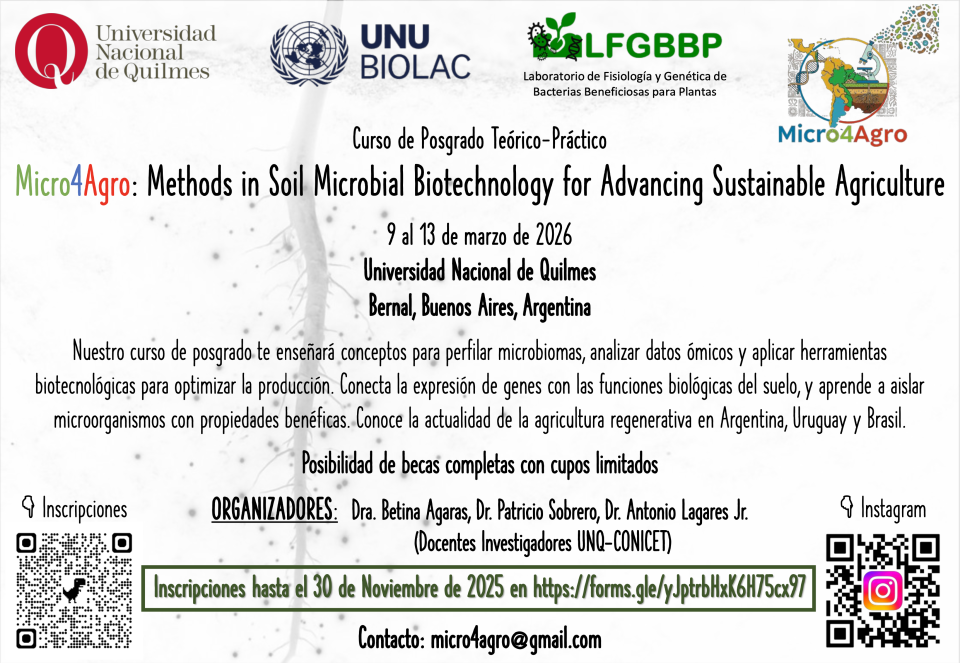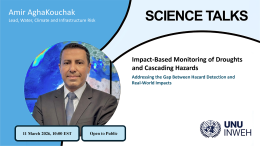The importance of soil for sustainable development can't be overstated. Agricultural output dependes on soil health, which is a measured in the biological activity of its community of Plant Growth Promoting Microorganisms. Simply put, crops can't grow on dead soils, depending only on fertilizers and irrigation.
To advance in the complex but fundamental understanding of soil analysis, the course Micro4Agro, Methods in Soil Microbial Biotechnology for Advancing Sustainable Agriculture will offer students a practical and theoretical soil microbiology course with a holistic and general approach, structured around the contribution of specialists in each proposed topic. We propose a contents' upgrade that reflects emerging trends, including the application of modern methodologies and sustainable agricultural practices. This edition places its focus on highlighting the biotechnological potential of soil microbiology.
The training will be structured into lectures in the mornings, and laboratory sessions (wet lab bench and bioinformatics workshops) in the afternoons, throughout the work week.
Activity Description
Lectures
I. Introduction (C1, 2h).
a) Introduction of the students. (Agaras / Lagares Jr. / Sobrero).
b) Course overview (venues within the University, guest lecturers, modality of the course) (Agaras / Lagares Jr. / Sobrero).
c) Soil Microbial biotechnology. Holistic vision of the soil. The soil as a "living organism". Soil as a (micro)habitat. The soil microbial network, health and ecosystemic services (Agaras).
II. Soil microorganisms.
a) Prokaryotic cellular production systems (C2, 2h): Introduction to physiology and genetics of Bacteria and archaea. Mechanisms of plant growth promotion. Overview of bacterial biofertilizers (Valverde).
b) Fungi cellular production systems (C3, 2h): General introduction to Fungi. Introduction to Arbuscular Mycorrhizal Fungi and ectomycorrhizae. Impact on plant growth promotion (Fernandez Bidondo / Bompadre).
III. Approaches to the study of edaphic communities by genetic and biochemical methods: Integrating biochemical Profiling for Precision Agroecology.
a) Omics I (C4, 2h): Use of soil enzymatic profiles for monitoring ecosystem services under different agronomic management (Covelli)
b) Omics II (C5, 2h): Integration of Lipids Micro/mico-biome Profile for Precision Agroecology (Ferrari)
c) Omics III (C6, 2h): Linking Gene Expression to Soil Function: Cutting-Edge Transcriptomic and Proteomic Techniques for microbial ecology prospection (Lagares Jr.).
d) Omics IV (C7, 2h): Advanced Soil DNA Microbial Profiling: From Genomics to Agricultural Sustainability (Guerrero)
e) Biological indicators (C8, 2 h): Tools for integration of Large-scale data for the study of biological indicators of soil health (Navarrete)
IV. Biogeochemical cycles in soils (from molecules to matter to molecules again) (C9, 2h): Macronutrient element cycles: carbon, nitrogen and phosphorus (Azziz).
V. Seminars on current topics on microbiomes and their dynamics in soils under agricultural and livestock management in Argentina, Uruguay and Brazil
Impact of agricultural practices on soil microbial communities under agro-livestock management in Uruguay (S1, 2hs, Azziz).
Impact of agricultural practices on soil microbial communities under agro-livestock management in Argentina (S2, 2hs, Wall).
Impact of agricultural practices on soil microbial communities under agro-livestock management in Brazil (S3, 2hs, Navarrete).
VI. Networking activity (3 h): "chalk talk"
Practical classes
✓ P1 CULTURABLE BACTERIA APPROACHES (5h): Selective culture and counting of probiotic bacteria and fungi: selection of bacteria of the genus Pseudomonas, phosphorus solubilizing bacteria and fungi in soil and plant samples (rhizosphere, diseased plants) (Agaras / Sobrero).
✓ P2 MYCORRHIZAE (5h): Techniques for sampling, identification, isolation and cultivation of root endophytic fungi. Observation of somatic and reproductive structures of taxonomic character (Fernandez Bidondo / Bompadre).
✓ P3 BIOCHEMICAL TECHNIQUES (2.5h): Enzymes in soil. Experimental approaches to the study of enzyme activity in soil samples. Soil Lipid extraction and chemical modification for GC. Introduction to CG chromatography. Analysis and discussion of results. (Covelli / Reyna)
✓ P3 BIOINFORMATICS WORKSHOP I (5h): Tools for bioinformatic analysis of soil DNA profiles. Diversity levels. Co-occurrence networks. Modeling (Guerrero / Sobrero / Lagares Jr).
✓ P4 MOLECULAR DNA TECHNIQUES (2.5h): Soil DNA extraction. Study of bacterial groups (Eubacteria and fungi) in soil samples by qPCR of marker genes. Preparation of reaction mixtures and analysis of results (Sobrero / Agaras).
✓ P6 BIOINFORMATICS WORKSHOP II (3h): Nature of data (physical, chemical and biological) and statistical tools available for multivariate analysis (Navarrete)
All the lectures and seminars will be conducted in English. Supporting resources (slides) will be shared with the students. Professors will share the bibliography used for the lectures. All this information will be made available to the students through hosting in the cloud. The University of Quilmes where the course will be held, offers classrooms with audio-visual resources suitable for carrying out the lectures (projector, whiteboard, etc), and comfortable desks for the students.
Our teaching laboratories are adequately equipped for practical activities, following hygiene and safety standards. The University gives us access to micropipettes, benchtop centrifuges, optical microscopes, fluorescence microscopes, multi-plate readers, laminar flow cabinets, real time qPCR equipment and electrophoresis equipment.
We also have classrooms equipped with state-of-the-art computers, internet access, projector and whiteboard. The infrastructure ensures that each student has access to a computer (or a desk where they can use their personal computer) during the bioinformatics practical sessions.
The course is intended for graduates in Biotechnology, Biochemistry, Biology, Agronomy, and related fields, who are pursuing postgraduate studies in disciplines related to soil microbiology and biotechnology. Participants should have a basic understanding of computational and microbiological practical issues. English proficiency is also recommended.
Application procedure
Applications will be received via this form (Google login required)
For more information, visit the Instagram account @micro4agro or send your questions to micro4agro@gmail.com
Last day to apply: November 30th, 2025.


